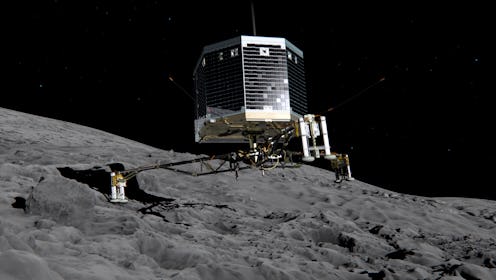News
Hey, We Just Landed On A Comet
Here's a real mind-blower for you. Did you know you can land a spacecraft on the surface of a comet? It's true! As a matter of fact, we just did it: a probe named Philae landed on a comet for the first time ever Wednesday, and it's pretty awe-inspiring. The probe was launched by the European Space Agency (ESA), and touched down on the comet in spite of a rocky landing — according to the BBC, the probe encountered technical difficulties with its anchors, which were meant to fire down into the comet to keep it tethered, as well as its thrusters, so the status of Philae is still rather touch-and-go.
Regardless, this is an exciting and genuinely unique scientific achievement. As the ESA' director-general Jean-Jacques Dordain said, it's "a big step for human civilization."
The next several hours could prove pivotal for Philae, as the ESA has to decide what to do to compensate for those technical difficulties. Absent both the anchors and thrusters properly functioning, as detailed by Vox’s Joseph Stromberg, there’s a risk that Philae could roll over. While it might go without saying, it’s easy to forget that there’s very little gravity on the surface of a comet, so how Philae will cope without its full compliment of tethering mechanisms is still unclear. Hopefully it stays shipshape for at least a few days, however — its battery should allow it about 64 hours to take photos and analyze soil samples, the first time we’ll be able to truly examine a comet’s composition.
Of course, since we live in the wildly futuristic world of 2014, the information that thing hadn't gone so smoothly came from a delightfully unique source — Philae itself, which tweeted that something had gone wrong after touching down on the comet’s surface.
The successful — well, relatively successful — landing of Philae was a major achievement, and a very complicated one. The tiny probe was carried out to the comet via a bigger vessel called Rosetta, which in August became the first spacecraft to successfully enter the orbit of a comet. As you might imagine, that's a logistical feat of epic proportions, and for Rosetta, it was the culmination of an epic trip through the solar system — first launched all the way back in 2004, Rosetta has reported traveled over 3 billion miles through outer space, traversing the solar system for a full decade.
In other words, a truly epic space journey is yielding an epic outcome. If you're curious to keep up-to-date on what's happening with Philae, you should take a look at ongoing coverage from The Guardian, which includes a lifestream directly from the European Space Operations Center in Germany. We're all pulling for you, Philae!
Images: Getty Images
